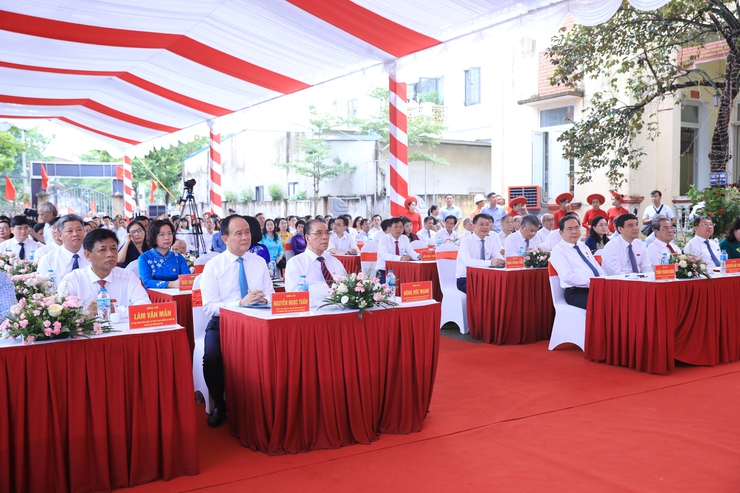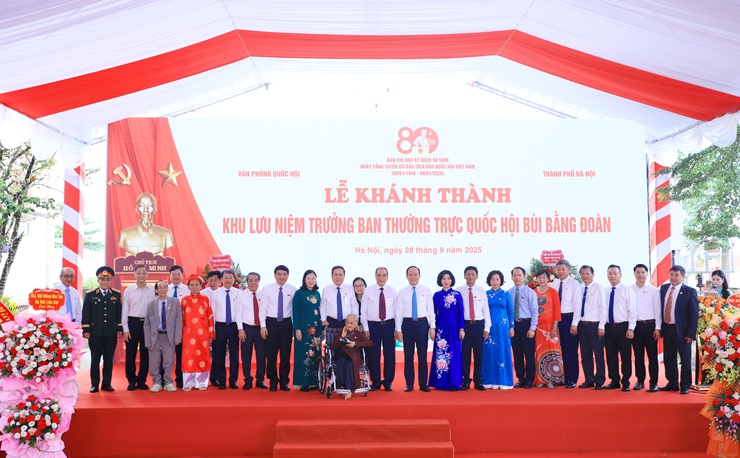The project, of great political and historical significance, was inaugurated to mark the 136th birth anniversary of Bui Bang Doan (September 19, 1889 – September 19, 2025), and is one of the key events celebrating the 80th anniversary of Vietnam's first general election to the National Assembly (January 6, 1946 – January 6, 2026).

Overview of the event.
Distinguished attendance
The ceremony was attended by former General Secretary Nong Duc Manh; Politburo member and National Assembly Chairman Tran Thanh Man; leaders of the National Assembly's Ethnic Council, committees, and central ministries and agencies.
From Hanoi, participants included Nguyen Ngoc Tuan, Deputy Secretary of the Hanoi Party Committee, Chairman of the Hanoi People's Council, Deputy Head of the city's NA delegation; Phung Thi Hong Ha, Standing Vice Chairwoman of the Hanoi People's Council; Bui Huyen Mai, Standing Vice Chairwoman of the Vietnam Fatherland Front Committee of Hanoi; and Nguyen Manh Quyen, Vice Chairman of the City People's Committee.
Honoring a patriotic intellectual
Bui Bang Doan (1889–1955), born into a Confucian family in Lien Bat village, Ung Hoa district (now Ung Thien commune, Hanoi), passed the imperial exams under the Nguyen dynasty and was renowned as an upright, incorruptible mandarin, who later served as Minister of Justice under the imperial court.
After the August Revolution in 1945, President Ho Chi Minh invited him to join the Government. In Vietnam's first general election in January 1946, he was elected as a National Assembly deputy and, at the Assembly's second session, chosen as Standing Committee Chairman of the National Assembly—a post he held until his passing in 1955.
Speaking at the ceremony, Nguyen Ngoc Tuan, Deputy Secretary of the Hanoi Party Committee and Chairman of the Hanoi People's Council, emphasized that Doan's life epitomized the spirit of "national unity and great cause above all else," serving as a shining example of an intellectual devoted to national independence, freedom, and the people's happiness.
The memorial site, built at Thieu Duc Duong ancestral temple within the Bat Chua communal relic complex, where the family of Doan has been traditionally honored, was completed on schedule with quality and solemnity. It reflects the deep gratitude of Hanoi's Party organization, government, and people toward this patriotic intellectual and prominent revolutionary figure.

Delegates at the event.
A legacy of integrity and unity
National Assembly Chairman Tran Thanh Man, in his remarks, affirmed that Bui Bang Doan was "a great personality and patriotic intellectual, a model of the Vietnamese intelligentsia adapting to historical destiny."
Serving as Standing Committee Chairman, alongside President Ho Chi Minh, he helped establish the first Constitution and legal framework of the country. His greatest legacy, the Chairman noted, lies in his spirit of fairness, rule of law, integrity, and wholehearted dedication to the people.
He recalled how Doan embodied national solidarity, encouraging the people to join the resistance and often writing letters to inspire soldiers and civilians during the most difficult moments of the struggle for independence and reunification.
Chairman Tran Thanh Man praised Hanoi's timely and responsible completion of the memorial project and urged the city and Ung Thien commune to ensure its proper management, conservation, and educational use, turning it into a lasting cultural landmark and "red address" for patriotic education.
He also stressed that the memorial serves not only as a tribute but also as a reminder for current and future generations of National Assembly deputies and officials to uphold the principles of solidarity, respect for intellectual contributions, and supremacy of the Constitution and the law—values that remain vital in Vietnam's ongoing nation-building and development.
At the ceremony, leaders of the Party, State, and Hanoi cut the ribbon to inaugurate the memorial and planted commemorative trees on the site.